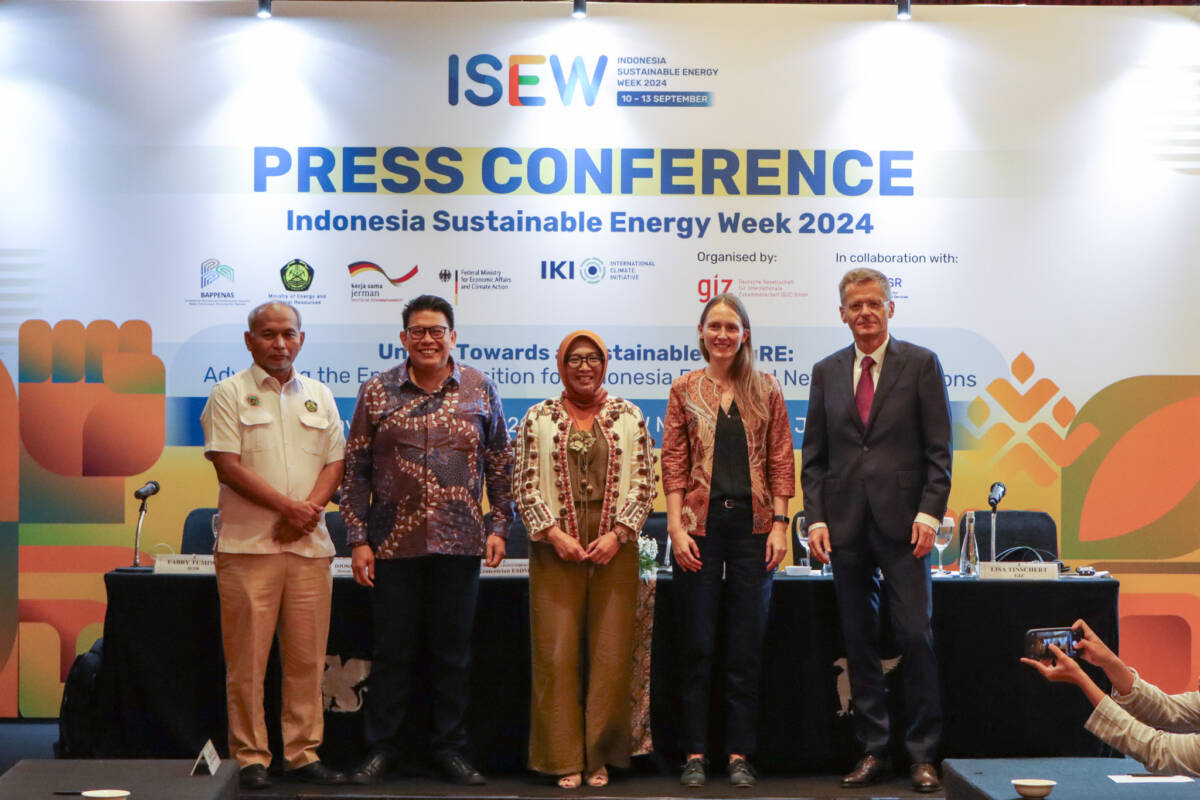Jakarta, September 10, 2024 – Indonesia envisions becoming one of the world’s largest economies by 2045, known as Golden Indonesia. To achieve developed nation status, the country requires sustainable high economic growth and a reduction in GHG emissions to reach net zero by 2060 or sooner.
One of the efforts to achieve Golden Indonesia 2045 is by accelerating an equitable or just energy transition. This was a key topic at the Indonesia Sustainable Energy Week (ISEW) 2024, themed ‘Uniting Towards a Sustainable Future: Advancing the Energy Transition for a Golden Indonesia and Net Zero Emissions’ (10/9/2024).
ISEW 2024 was officially opened by representatives from the Ministry of Planning and Development/Bappenas, the Ministry of Energy and Mineral Resources (MEMR), the Embassy of the Federal Republic of Germany, GIZ Indonesia and ASEAN, and the Institute for Essential Services Reform (IESR).
Thomas Graf, Deputy Head of Mission at the Embassy of the Federal Republic of Germany for Indonesia, ASEAN, and Timor Leste, stated during the Indonesia Sustainable Energy Week (ISEW) 2024 that Indonesia’s energy transition journey is supported by many countries, including Germany.
“Germany is one of the countries committed to funding the energy transition under the Just Energy Transition Partnership (JETP). To date, Germany has contributed approximately USD 1 billion to JETP projects and around USD 2.4 billion to strengthen Indonesia’s sustainable energy sector,” Thomas said in his speech.
At the same event, Ervan Maksum, Deputy for Facilities and Infrastructure at the Ministry of National Development Planning/Bappenas, emphasized that accelerating an equitable energy transition is crucial to achieving Golden Indonesia 2045.
“We need to promote an equitable energy transition. Providing low-carbon electricity is essential for regional development. Building a reliable transmission system that can accommodate renewable energy outside Java is crucial for encouraging equity,” Ervan explained.
Regarding renewable energy capacity for 2060, Prof. Eniya Listiani Dewi, Director General of New Renewable Energy and Energy Conservation, stated that there is a preparation for a new draft of the Electricity Supply Business Plan (RUPTL). The draft RUPTL aims for more than 367 GW of renewable energy by 2060, with variable renewable energy with storage contributing to 42 percent of this renewable capacity.
Fabby Tumiwa, Executive Director of IESR, highlighted four key factors needed to accelerate the energy transition: supportive policies for renewable energy investment, availability of renewable energy technology, access to funding, and community and stakeholder support and participation. Fabby added that, in cooperation projects between Indonesia and Germany, IESR has collaborated with GIZ Indonesia and the Ministry of PPN/Bappenas on the Clean, Affordable, and Secure Energy (CASE) Project for Southeast Asia. Additionally, IESR has worked with GIZ Indonesia and the Ministry of Energy and Mineral Resources on the Sustainable Energy Transition Indonesia (SETI) project to accelerate the energy transition in Indonesia.
“The government must stay consistent and fully commit to achieving the 23 percent renewable energy mix target by 2025. Currently, the government’s strategies include finalizing power purchase agreements (PPAs) for renewable energy between developers and PLN, as well as accelerating the implementation of rooftop solar power plants. These efforts are expected to help meet the renewable energy mix target,” said Fabby.
Lisa Tinschert, Director of the GIZ Indonesia/ASEAN Energy Program, stated that ISEW 2024 is a key opportunity to strengthen the strategic partnership between Indonesia and Germany, particularly in sustainable energy transition. GIZ remains committed to supporting the Indonesian government’s efforts to achieve its renewable energy and net-zero emissions targets. Effective collaboration among various stakeholders, including government, the private sector, and civil society, is crucial to ensuring a fair and inclusive transition.
ISEW is a significant element of 30 years of energy sector cooperation between Indonesia and Germany, providing both technical and financial support for renewable energy projects. ISEW 2024 has three main objectives: (1) to serve as a high-level forum for meetings between the governments of Indonesia and Germany to support both global and national energy transitions; (2) to connect policymakers with the public, including civil society organizations, academia, the younger generation, and non-energy stakeholders; and (3) to raise awareness of sustainable technologies among the public, private sector, and communities.

